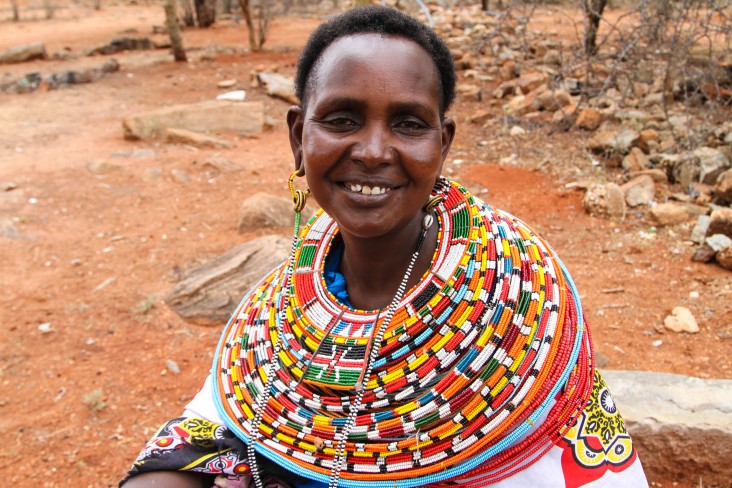Speeches Shim

January 2018—As a member of the Samburu tribe, 30-year-old Nalan’gu Lokoloto is expected to remain at her home in Kalama Conservancy—for days and sometimes weeks—while her husband is out tending to the family’s livestock. She has never attended formal school.
In 2016, things turned around for her. “I found out people around the world like our beautiful, traditional jewelry, which I learned to make over the years,” said Lokoloto.
In the past, Lokoloto and other women in her community often earned money by stripping local trees to make and sell charcoal or by brewing illicit alcohol. These activities are damaging both to the local environment and the community.
Kalama, established in 2002 and located in Isiolo County, is one of 35 community conservancies across northern and coastal Kenya supported by USAID and local conservation organization Northern Rangelands Trust (NRT). Created in 2004 with USAID support, NRT works to develop resilient conservancies that secure peace and conserve natural resources.
The conservancies are legal enterprises managed by the communities that reside within and around important wildlife corridors. These conservancies cover 7 percent of Kenya’s land mass (445,000 square kilometers), creating space for the 65 percent of wildlife that live outside national parks and reserves. The concept of community conservancies was pioneered by USAID and the Kenya Wildlife Service in the early 1980s.
By learning land use planning and management skills, and engaging in businesses such as environmentally sustainable tourism and livestock marketing, these communities have helped reduce poaching and conserve important natural resources, including water reservoirs and forests. Kenya’s wildlife-based tourism sector is crucial to the country’s economy.
Lokoloto’s women’s group received training to brand and market their creative beadwork designs internationally. Supported by USAID, NRT and BeadWORKS Kenya, a social enterprise, the women translate centuries-long traditions into income.
“I used to rely mostly on my husband, and I never thought I could also contribute meaningfully towards our children’s needs, especially since I could not really find a job,” said Lokoloto.
Lokoloto quickly became one of the star beaders in her group. “As a star beader, I come up with creative ideas, and I train the other 22 women. I make sure they make great items which can sell well,” she said.
Unique, intricately beaded jewelry, ornaments and key rings handmade by women living in community conservancies throughout northern Kenya are sold both locally and as far away as Australia and the United States through the BeadWORKS website (link is external).
On average, each woman earns 5,000 Kenyan shillings (KES), or $49, per month from the sales. In addition to having a consistent and reliable source of income, the women can also access credit through a savings and credit organization set up by NRT, through which they save the money they earn and take out loans to finance other business ventures.
“Slowly, we are encouraging more women to get into business. Look at us—we used to be only housewives and now we are also entrepreneurs,” said beadwork trainer Namunyak Lemparia.
Five percent of proceeds from the group’s annual sales is donated to the conservancy. In April 2017, women beaders in Kalama donated more than KES 351,000 ($3,400), and a similar women’s group in Sera Conservancy donated KES 289,018 ($2,800). The conservancies, in turn, use 40 percent of the money they receive to support conservation and security, and 60 percent to fund scholarships and local development projects.
In 2016, USAID helped more than 404,000 people in Kenya start and maintain eco-based businesses—like livestock trading, wildlife-based tourism (lodges) and women's bead work—that are fueling local development. These groups earned more than KES 86.7 million ($840,000) while reducing pressure on the environment and protecting wildlife.
LINKS
Follow @USAIDKenya (link is external), on Facebook (link is external), on Flickr (link is external)

Comment
Make a general inquiry or suggest an improvement.